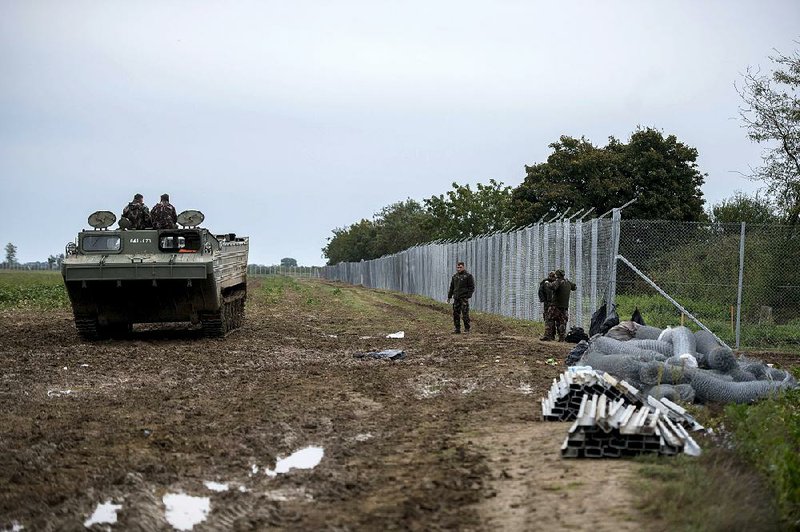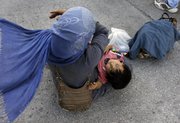BAPSKA, Croatia -- Doctors treated migrant children -- including newborns -- for exposure as dropping temperatures Monday worsened the plight of asylum seekers walking for days trying to reach sanctuary in Europe.
One group of migrants crossed into Croatia near the small village of Bapska, walking through corn fields and forests late Sunday to pass through a small gate that marks the border with Serbia.
Vladimir Bozic, a physician from Doctors without Borders, said he had treated many young children for temperature-related illnesses.
"We saw a 1-month old baby, even [one just] 15 days," Bozic said.
Volunteers from the United Nations High Commissioner from Refugees handed out blankets, warm drinks and food to those fleeing conflict and poverty in the Middle East, Africa and Asia. Many are suffering in rising numbers from colds and the flu after days or weeks on the move in the rain and the mud.
"I expect even more, with the worsening of these cold conditions," Bozic said. "Winter is coming."
The overnight low temperatures for Bapska were forecast for 47 today and 46 Wednesday.
Migrants lined up at Croatia's Opatovac transit center Monday to take trains out of the country. About 78,000 asylum seekers have crossed into Croatia since Sept. 15, when Hungary closed its border with Serbia, diverting the migrants to Croatia.
Saed Al Mousawi, who fled from Afghanistan, said the drop in temperatures had made many feel unwell, especially children. The route has been hard, but he's determined to keep going.
"We have dreams to have a peaceful life, without war, without any other distractions," he said.
Little peace remained, though, between Balkan rivals Serbia and Croatia. The two former Yugoslav nations, which were at war in the 1990s, imposed tit-for-tat border regulations last week before backing down and removing them under apparent pressure from the European Union.
Croatia has been accusing Serbia of sending thousands of migrants to its border instead of channeling them north to Hungary. On Monday, the two nations resumed sniping at each other.
Croatian Prime Minister Zoran Milanovic, who is running for re-election, said he no longer wanted to speak to his Serb counterpart, Aleksandar Vucic, on the issue of migrants.
"We are dealing with a country that can be an organized state, but with a leadership which isn't capable of making it," Milanovic said. "They are not telling the truth; they are not sticking to the agreements."
Vucic shot back that he would "speak even to the devil" if he thought that would be beneficial to Serbia and to regional stability.
"Maybe it's not bad that the difference over the issue can now be openly seen," he said.
In Slovakia, the first of 500 Syrian asylum seekers started arriving to take up three-month residency at a state-run dormitory in the town of Gabcikovo, which voted last month to oppose the facility's reopening.
During the early 1990s, the dormitories at the Slovakian Technical University in the town of 5,000 sheltered people fleeing the Balkan wars.
The dormitories were used again to house other refugees and migrants seeking asylum in Europe.
"We had Chechens, Iranians, Sri Lankans, Romanians, you name it," said Zoltan Jaros, an administrator of the dorms.
Jaros said that between 1993 and 2008, more than 5,000 refugees and migrants spent time at the campus dorms.
Zoltan Jakus, who led the referendum effort last month, said volunteers collected 1,881 signatures in just three days to stage the vote and that the "no" campaign won 97 percent of the ballots on a 60 percent turnout.
"So that says something," Jakus said.
"The village people are ready to help. We would provide clothes, food and help them on their way, but we don't want them to live here," he said.
With the migrant crisis escalating, European Union leaders last week approved a plan to spread 120,000 asylum seekers across 28 nations on the continent, over the objections of central European countries. Hungary, Romania, the Czech Republic and Slovakia voted against the measure, a rare note of discord.
The EU plan calls for 800 refugees to be eventually settled in Slovakia, though Slovak leaders oppose this.
The continuing opposition to the distribution of asylum seekers comes as the EU announced it will be able to go after suspected migrant trafficking and smuggling vessels in the international waters of the Mediterranean as of next week.
Monday's EU statement said Operation Sophia will allow naval personnel of EU nations "to board, search, seize and divert vessels suspected of being used for human smuggling or trafficking on the high seas, in line with international law" as of Oct. 7.
In reaction to the tens of thousands of people crossing the Mediterranean and the thousands of lives lost, the EU set up an operation that initially centered on saving those drifting on the high seas and would later also include directly targeting smuggling and trafficking operations.
The operation started in June, and since it reached operational capability on July 27, it has saved 2,186 people from drowning.
EU member states have now committed enough ships, helicopters and other military equipment to start the active phase of the counter-smuggling operation.
Information for this article was contributed by Amer Cohadzic, Iuliia Subbotovska, Dusan Stojanovic, Danica Kirka and Raf Casert of The Associated Press and by William Booth and Gergo Saling of The Washington Post.
A Section on 09/29/2015


